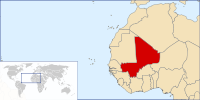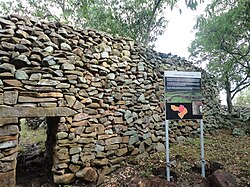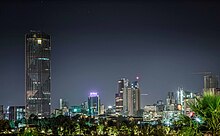Portal:Africa



Africa is the world's second-largest and second-most populous continent after Asia. At about 30.3 million km2 (11.7 million square miles) including adjacent islands, it covers 20% of Earth's land area and 6% of its total surface area. With nearly 1.4 billion people as of 2021, it accounts for about 18% of the world's human population. Africa's population is the youngest among all the continents; the median age in 2012 was 19.7, when the worldwide median age was 30.4. Based on 2024 projections, Africa's population will reach 3.8 billion people by 2099. Africa is the least wealthy inhabited continent per capita and second-least wealthy by total wealth, ahead of Oceania. Scholars have attributed this to different factors including geography, climate, corruption, colonialism, the Cold War, and neocolonialism. Despite this low concentration of wealth, recent economic expansion and a large and young population make Africa an important economic market in the broader global context. Africa has a large quantity of natural resources and food resources, including diamonds, sugar, salt, gold, iron, cobalt, uranium, copper, bauxite, silver, petroleum, natural gas, cocoa beans, and.
Africa straddles the equator and the prime meridian. It is the only continent to stretch from the northern temperate to the southern temperate zones. The majority of the continent and its countries are in the Northern Hemisphere, with a substantial portion and a number of countries in the Southern Hemisphere. Most of the continent lies in the tropics, except for a large part of Western Sahara, Algeria, Libya and Egypt, the northern tip of Mauritania, and the entire territories of Morocco, Ceuta, Melilla, and Tunisia, which in turn are located above the tropic of Cancer, in the northern temperate zone. In the other extreme of the continent, southern Namibia, southern Botswana, great parts of South Africa, the entire territories of Lesotho and Eswatini and the southern tips of Mozambique and Madagascar are located below the tropic of Capricorn, in the southern temperate zone.
Africa is highly biodiverse; it is the continent with the largest number of megafauna species, as it was least affected by the extinction of the Pleistocene megafauna. However, Africa also is heavily affected by a wide range of environmental issues, including desertification, deforestation, water scarcity, and pollution. These entrenched environmental concerns are expected to worsen as climate change impacts Africa. The UN Intergovernmental Panel on Climate Change has identified Africa as the continent most vulnerable to climate change.
The history of Africa is long, complex, and varied, and has often been under-appreciated by the global historical community. In African societies the oral word is revered, and they have generally recorded their history via oral tradition, which has led anthropologists to term them oral civilisations, contrasted with literate civilisations which pride the written word. During the colonial period, oral sources were deprecated by European historians, which gave them the impression Africa had no recorded history. African historiography became organized at the academic level in the mid-20th century, and saw a movement towards utilising oral sources in a multidisciplinary approach, culminating in the General History of Africa, edited by specialists from across the continent. (Full article...)
Selected article –
Thimlich Ohinga is a complex of stone-built ruins in Migori county, Nyanza Kenya, in East Africa. It is the largest one of 138 sites containing 521 stone structures that were built around the Lake Victoria region in Kenya. These sites are highly clustered. The main enclosure of Thimlich Ohinga has walls that are 1–3 m (3.3–9.8 ft) in thickness, and 1–4.2 m (3.3–13.8 ft) in height. The structures were built from undressed blocks, rocks, and stones set in place without mortar. The densely packed stones interlock. The site is believed to date to the 15th century or earlier. (Full article...)
Featured pictures –
Did you know (auto-generated) -

- ... that Alisha Kramer worked to fight HIV/AIDS, tuberculosis, and inequity in women's health in Africa and Europe as a program coordinator for the Center for Strategic and International Studies?
- ... that members of The Links, an elite organization of upper-class Black women, include Betty Shabazz, Marian Wright Edelman, and Kamala Harris?
- ... that desert kites in the Middle East and North Africa were used as traps for wild game?
- ... that opera singer Charles Holland spent much of his career in Europe as opportunities in classical music for African Americans were limited?
- ... that Susan Murabana created Africa's first permanent planetarium?
- ... that Ralph E. Brock was the first academically trained African-American forester in the United States?
Categories
Selected biography –
Chief Funmilayo Ransome-Kuti, MON ( /ˌfʊnmiˈlaɪjoʊ ˈrænsəm ˈkuːti/; born Frances Abigail Olufunmilayo Olufela Folorunso Thomas; 25 October 1900 – 13 April 1978), also known as Funmilayo Aníkúlápó-Kuti, was a Nigerian educator, political campaigner, suffragist, and women's rights activist.
Fumilayo Ransome Kuti was born in Abeokuta in what is now in Ogun State, and was the first female student to attend the Abeokuta Grammar School. As a young adult, she worked as a teacher, organizing some of the first preschool classes in the country and arranging literacy classes for lower-income women. (Full article...)
Selected country –
 |
 |
||

| |||
Mali, officially the Republic of Mali (French: République du Mali), is a landlocked nation in Western Africa. It is the seventh largest country in Africa. It borders Algeria on the north, Niger on the east, Burkina Faso and the Côte d'Ivoire on the south, Guinea on the south-west, and Senegal and Mauritania on the west. Formerly French Sudan, the country is named after the Mali Empire. The name of the country comes from the Bambara word for hippopotamus; the name of its capital city, Bamako comes from the Bambara word meaning "place of crocodiles".
Mali is one of the poorest countries in the world. With 65% of its land area desert or semidesert, economic activity is largely confined to the riverine area irrigated by the Niger River. About 10% of the population is nomadic and some 80% of the labor force is engaged in farming and fishing. Industrial activity is concentrated on processing farm commodities. Pottery is also practised by women whose wares are bought by dealers and are transported to markets where they are sold by traders. Mali is heavily dependent on foreign aid and vulnerable to fluctuations in world prices for cotton, its main export. (Read more...)
Selected city –
Addis Ababa (/ˌædɪs ˈæbəbə/;Amharic: አዲስ አበባ, lit. 'new flower' [adˈdis ˈabəba] ) is the capital and largest city of Ethiopia. In the 2007 census, the city's population was estimated to be 2,739,551 inhabitants. Addis Ababa is a highly developed and important cultural, artistic, financial and administrative center of Ethiopia. It is widely known as one of Africa's major capitals.
The founding history of Addis Ababa dates back to the late 19th century by Menelik II, Negus of Shewa, in 1886 after finding Mount Entoto unpleasant two years prior. At the time, the city was a resort town; its large mineral spring abundance attracted nobilities of the empire and led them to establish permanent settlement. It also attracted many members of the working classes – including artisans and merchants – and foreign visitors. Menelik II then formed his imperial palace in 1887. Addis Ababa became the empire's capital in 1889, and subsequently international embassies were opened. Urban development began with the 20th century, without any prior planning. (Full article...)
In the news
- 12 February 2024 –
- Two boats collide on the Congo River near Kinshasa, Democratic Republic of the Congo; with the death toll remains unclear. (AP)
- 11 February 2024 – 2023 Africa Cup of Nations
- In association football, hosts Ivory Coast win their third Africa Cup of Nations by defeating Nigeria 2–1 in the final. Sébastien Haller scores the winning goal in the 81st minute. (The Guardian)
- 10 February 2024 – Somali civil war
- Four Emirati soldiers and a Bahraini military officer are killed, while ten other people are injured, when a soldier opens fire at a military base in Mogadishu, Somalia, before being killed in the ensuing shootout. Al-Shabaab claims responsibility. (AP)
- 10 February 2024 –
- A Eurocopter EC130 helicopter crashes near Nipton, California, United States, killing all the six people on board, including Nigerian banker Herbert Wigwe. (CBS News)
- 10 February 2024 – 2023–2024 Senegalese protests
- Violent protests occur in Senegal following an announcement by President Macky Sall that presidential elections have been delayed from February 25 to December 15. (Sky News)
- 9 February 2024 –
- At least 18 people are killed during a collision between a bus and a truck on a road in Kinshasa, Democratic Republic of the Congo. (AP)
Updated: 16:33, 14 February 2024
General images -
Africa topics
More did you know –
- ...that from 1926 to 1940, the Union Minière du Haut Katanga had a virtual monopoly of the world uranium market?
- ...that Anfillo is an endangered language of Western Ethiopia, spoken only by a few hundred adults above sixty?
- ...that Bono Manso, the capital of Bono state, was an ancient Akan trading town in present-day Ghana, which was frequented by caravans from Djenné as part of the Trans-Saharan trade?
- ...that Reverend John Chilembwe is celebrated as the first Malawian nationalist, and was a martyr for his cause?
Related portals
Major Religions in Africa
North Africa
West Africa
Central Africa
East Africa
Southern Africa
Associated Wikimedia
The following Wikimedia Foundation sister projects provide more on this subject:
-
Commons
Free media repository -
Wikibooks
Free textbooks and manuals -
Wikidata
Free knowledge base -
Wikinews
Free-content news -
Wikiquote
Collection of quotations -
Wikisource
Free-content library -
Wikispecies
Directory of species -
Wikiversity
Free learning tools -
Wikivoyage
Free travel guide -
Wiktionary
Dictionary and thesaurus

























































































